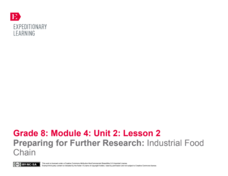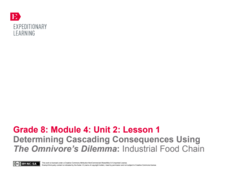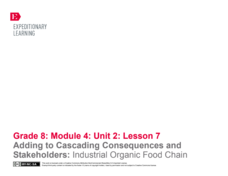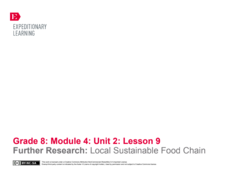Alachua County Public Schools
Food Chain
Two to four players receive seven cards each, with plants, animals, or nitrates depicted. They place what they have onto their own empty game board with the objective to complete a food chain. The game is a fun way to reinforce learning...
Curated OER
Food Chains
Learners take a look at the relationship between organisms in food chains, food webs, and energy pyramids. After an opening demonstration by the teacher, pupils are split up into groups. Each one is assigned an environment such as:...
Virginia Department of Education
Freshwater Food Chains
What's in the water? Encourage your class to further explore this question and learn about pond ecosystems, food chains, and food webs as they complete this hands-on activity. They view the environment from a new perspective after...
NOAA
Understanding Food Chains and Food Webs
Jump into an exploration of marine ecosystems with the first lesson in this four-part series. After first learning about crustaceans, mollusks, and other forms of sea life, young marine biologists view a PowerPoint presentation that...
EngageNY
Adding to Cascading Consequences and Stakeholders: Hunter-Gatherer Food Chain
Could the hunter-gatherer food chain feed everyone in the United States? To consider the question, pupils use their research and add to the Cascading Consequences chart based on Michael Pollan's hunter-gatherer food chain from The...
EngageNY
Adding to Cascading Consequences and Stakeholders: Industrial Food Chain
Young researchers create a class Cascading Consequences chart to see how the industrial food chain affects people, animals, and the environment. They also work in teams to complete a Stakeholders chart for the industrial food chain model...
EngageNY
Determining Cascading Consequences Using The Omnivore’s Dilemma: Hunter-Gatherer Food Chain
Focusing on the consequences of the hunter-gatherer food chain that Michael Pollan discusses in The Omnivore's Dilemma, teams work together to create hunter-gatherer food chain consequences charts. Next, scholars view other groups'...
EngageNY
Preparing for Further Research: Industrial Food Chain
Using an informative resource, pupils discover how to write research questions that are focused, answerable, and relevant. Scholars evaluate resources about the industrial food chain from Michael Pollan's The Omnivore's Dilemma and then...
Baylor College
Food Webs
Explore various ecosystems from around the world as your class discovers the interdependence of all living things. Using the provided sets of ecosystem cards, young scientists work in small groups building food webs to demonstrate the...
EngageNY
Determining Cascading Consequences Using The Omnivore’s Dilemma: Industrial Food Chain
Which of Michael Pollan's four food chains from his book The Omnivore's Dilemma would best feed everyone in the United States? Using a thought-provoking resource, scholars learn how to create a Cascading Consequences chart to answer the...
EngageNY
Determining Cascading Consequences Using The Omnivore’s Dilemma: Industrial Organic Food Chain
Organic versus conventional farming: which option is best? Pupils use Michael Pollan's The Omnivore's Dilemma to determine the cascading consequences of the industrial organic food chain. They work in research teams to create an...
EngageNY
Using Search Terms for Further Research: Industrial Organic Food Chain
Class members conduct independent research to continue examining the consequences of the industrial organic food chain from Michael Pollan's The Omnivore's Dilemma. Pupils learn about source credibility and effective search terms, then...
EngageNY
Adding to Cascading Consequences and Stakeholders: Industrial Organic Food Chain
Researchers continue determining the effects of the industrial organic food chain that Michael Pollan describes in The Omnivore's Dilemma. In teams, pupils add to their Cascading Consequences charts and complete Stakeholders charts based...
EngageNY
Further Research: Hunter-Gatherer Food Chain
It's time to gather nuts, berries, and lots of information. Scholars continue on their quest to determine the consequences of each of Michael Pollan's food chains from The Omnivore's Dilemma. Using research questions developed in a...
EngageNY
Local Sustainable Food Chain: Determining Cascading Consequences Using The Omnivore’s Dilemma
What are the consequences of the local, sustainable food chain? Research teams explore the question as they review Michael Pollan's The Omnivore's Dilemma. The teams complete Cascading Consequences charts and then choose research topics...
EngageNY
Further Research: Local Sustainable Food Chain
Researchers review how to create citations, find reliable sources, and paraphrase. Next, using guided task cards and their researcher's notebooks, they investigate the question they developed in instructional activity eight about the...
EngageNY
Adding to Cascading Consequences and Stakeholders: Local Sustainable Food Chain
Equip the class to perfect their presenting skills. To prepare for an upcoming oral presentation, scholars create and analyze an anchor chart for effective speaking skills. Pupils also use their research to add to their Cascading...
Howard Hughes Medical Institute
Modeling Food Webs in Darién, Panama
It's a jungle out there! Young biologists journey to Darien, Panama to examine the intricate relationships between the organisms that inhabit the jungle. Groups begin by demonstrating an understanding of energy flow in ecosystems, then...
Curated OER
Exploring Owls
What can young scientists discover from dissecting an owl pellet? Explore the owl food chain, beginning with an introduction to these predatory birds. Suggested strategies here include creating a podcast and purchasing a poster, however...
Wild BC
Bearly Any Ice
After reviewing food chains, your class members participate in an arctic predator-prey game that exemplifies the impact of climate change of food availability. If you are in a hurry, skip this lesson, but if you have the time to...
Exploring Nature Educational Resources
Building A Classroom Food Web
From bears and owls to chipmunks and trees, all life depends on the sun for the energy to survive. Young biologists develop an understanding of this big idea as they arrange this series of plant and animal picture cards into food webs...
Howard Hughes Medical Institute
Creating Chains and Webs to Model Ecological Relationships
The sustainability of an ecosystem depends on many factors and changes constantly. Young scholars consider these factors as they use a set of cards to create food webs. They review key scientific vocabulary such as predator, prey,...
NOAA
Seafood and Human Health
Whether your young biologists realize it or not, humans play a significant role in marine ecosystems. To help them understand this fact children first create graphical representations that show homo sapiens' place in marine food chains,...
Alabama Learning Exchange
Nature's Life Cycle
Become a member of the Pollution Patrol and stand up to litter! After discussing the life cycle of seeds and discussing how plants figure into the food chain, young conservationists engage in several activities involving podcasts,...
Other popular searches
- Desert Food Chain
- Animal Food Chain
- Deciduous Forest Food Chains
- Pond Food Chain
- Ocean Food Chain
- Frog Food Chain
- Food Chains in Biomes
- Arctic Food Chain
- Desert Animal Food Chain
- Ocean Animals Food Chain
- Coral Reef Food Chain
- Marine Science Food Chain
























